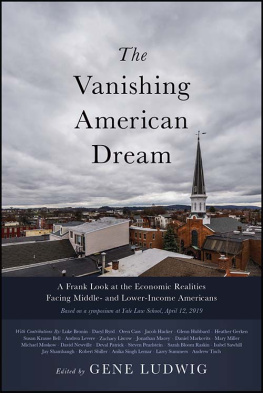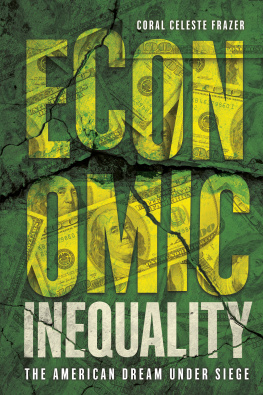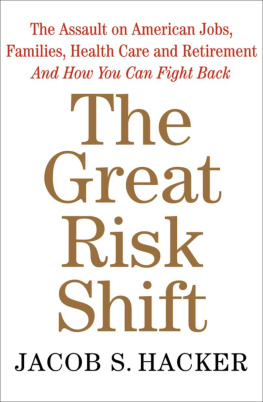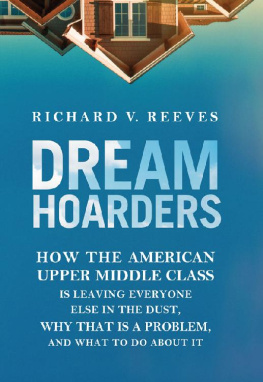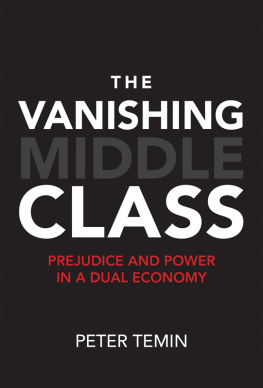Gene Ludwig has eloquently captured the struggle of so many American communities to realize the American dream for a new generation. In tracing the economic decline of vibrant industrial towns, he asks the hard questions about technology, globalization, the role of government, trade, our educational system, and corporations. He and the extraordinary group of assembled experts force us, with data and insightful analysis, to confront the inequality of our system. But, they also offer solutions at the local level that every businessperson, politician, and policymaker should consider in building a more prosperous future for all Americans.
The United States middle class is shrinking and the stressed underclass is growing. Income inequality is worsening and fracturing our country. This vital book has gathered the best minds to seek answersboth causes and remedies. For those who care, this is urgent required reading.
Senator Don Riegle (DMI; 19761994) and former Chair of the Senate Banking Committee
This book is a call to arms. We must refocus to ensure the American Dream is available to future generations by creating more collaborations, more public- private partnerships, and investing in our infrastructure to get the job done.
Sandy Weill, Chairman Emeritus, Citigroup, Inc.
To help bring America together and identify the actions needed to rekindle a vigorous middle class, Gene Ludwig convened an extraordinary bipartisan, diverse group of participants with deep knowledge drawn from academia, policy formation, government, business, and community leadership. It is a highly readable action guide to doing the always unfinished work of forming a more perfect union and should be widely read.
The
Vanishing
American
Dream
A Frank Look at the Economic Realities
Facing Middle- and Lower-Income Americans
A Symposium at Yale Law School, April 12, 2019
Edited by GENE LUDWIG

New York
This publication is designed to provide accurate and authoritative information in regard to the subject matter covered. It is sold with the understanding that the publisher and author are not engaged in rendering legal, accounting, or other professional services. If legal advice or other expert assistance is required, the services of a competent professional should be sought.
Published by Disruption Books
New York, NY
www.disruptionbooks.com
Copyright 2020 by The Ludwig Family Foundation, Inc.
All rights reserved.
Rights to this book are held by The Ludwig Family Foundation, a non-profit organization, and all net proceeds from its publication are expected to be given by the Foundation to organizations serving homeless populations in the United States.
No part of this book may be reproduced, stored in a retrieval system, or transmitted by any means, electronic, mechanical, photocopying, recording, or otherwise, without express written permission from the copyright holder. Requests for permission should be directed to .
Distributed by Disruption Books
For ordering information or special discounts for bulk purchases, please contact Disruption Books at .
Print ISBN: 978-1-63331-044-5
eBook ISBN: 978-1-63331-045-2
Library of Congress Cataloging-in-Publication Data
Names: Ludwig, Eugene Allan, 1946-editor.
Title: The vanishing American dream : a frank look at the economic realities facing middle- and lower-income Americans : a symposium at Yale Law School, April 12, 2019 / edited by Gene Ludwig.
Description: First edition. | New York : Disruption Books, [2020] | Includes bibliographical references and index.
Identifiers: LCCN 2020015905 (print) | LCCN 2020015906 (ebook) | ISBN 9781633310445 (hardback) | ISBN 9781633310452 (epub)
Subjects: LCSH: Income distributionUnited States. | American Dream. | Middle classUnited States. | PoorUnited States. | United StatesEconomic conditions21st century. | United StatesEconomic Policy2009
Classification: LCC HC110.I5 V36 2020 (print) | LCC HC110.I5 (ebook) | DDC 339.2/20973dc23
LC record available at https://lccn.loc.gov/2020015905
LC ebook record available at https://lccn.loc.gov/2020015906
Cover and text design by Sheila Parr
Cover image Shutterstock / Christian Hinkle
First Edition
This book is dedicated to my wife Carol along with my children
Abigail, Elizabeth, and David and my brother Ken.
Contents
Preface
The COVID-19 Storm
xi
Introduction
Seeing the American Economy Through a Glass, Darkly
First Panel
How bad off economically are middle- and lower-income Americans, and why?
Second Panel
What can be done at the national level to boost the economic
well-being of middle- and lower-income Americans?
Third Panel
What can be done at the local level, in cities like New Haven, Connecticut,
to boost the economic well-being of middle- and lower-income Americans?
Preface
The COVID-19 Storm
When, in 2018, I first approached Dean Heather Gerken about hosting a forum at Yale Law School on the plight of lower- and middle-income Americans, I was driven primarily to address a masked and increasingly grave deterioration in the nations economic environment for that specific but enormous segment of the population. Amid a raft of seemingly very positive economic indicatorsa low unemployment rate, strong GDP growth, buoyant market benchmarksI had concluded that too few policymakers were taking heed of the fact that many communities were being left behind. Too frequently, Washington insiders seemed sanguine that wealth accruing at the top of the income scale would eventually trickle down to the rest of the country. A closer look at localities like the place where I grew upYork, Pennsylvaniarevealed that thinking to be entirely off base. And Yorks experience wasnt unique. It was reflected in neglected corners of thriving cities, in hollowed-out rural communities, and thousands of other American towns and small cities as well.
A year after the Yale forum, and just before this book was scheduled to go to press, the nation was both newly laid low by the economic crisis precipitated by the COVID-19 pandemic and newly enraged by the scourge of racial inequality. Americans are losing faith in their nations promise. The unemployment rate is 14.7 percent overallbut 21.2 percent for those without a high school degree. At the forum a year before, many of us had anticipated a recession. But the downturn now appears significantly deeper even than what the nation faced amid the financial crisis of 2008. So, positive economic indicators no longer obscure our understanding of the economys declining health because, well, there are very few positive economic indicators to speak of.
Thats why the substance of our conversation in the spring of 2019 is more relevant, important, and resonant than ever. The wisdom shared over the course of that day, among a group amassed from the top echelons of academia, policy, business, and banking, anticipated many of todays challengesbut dangers lurk today that existed beyond the scope of our conversation in 2019. That adds a new urgency to the tenor of our conversation. As is now utterly clear, we do not live in a Panglossian world where most believe that all is for the best in the best of all possible worlds. The protests that erupted after George Floyds murder make clear that weve done too little even during good times to address the ongoing legacy of racism. And yet it would appear some of the same myopia that spurred policymakers to ignore the plight of lower- and middle-class Americans before the crisis is now steering efforts to shape the recovery.

